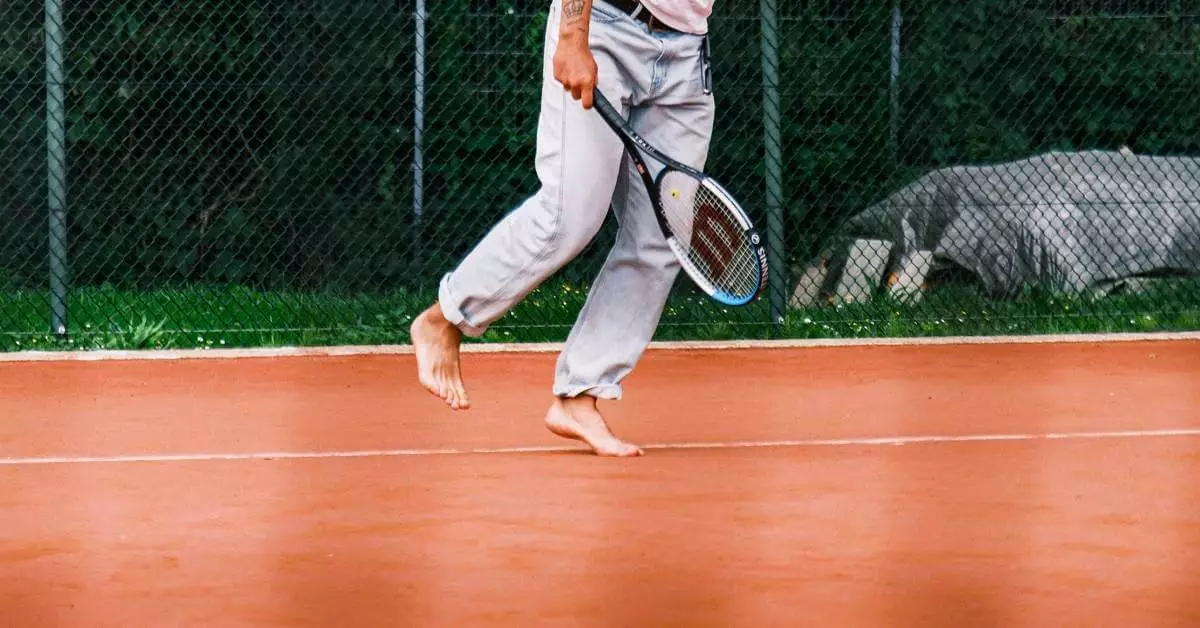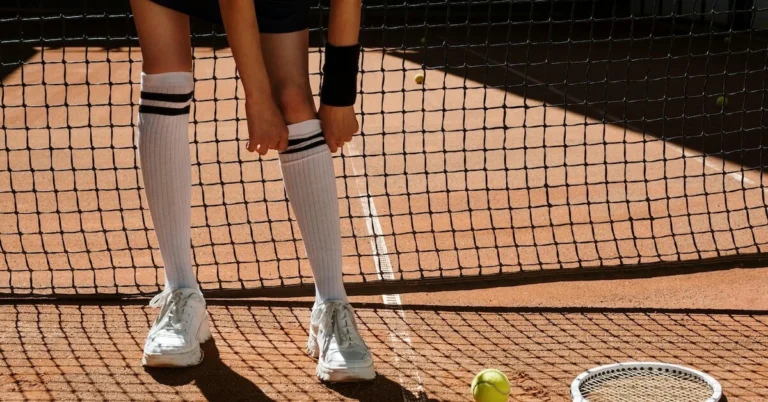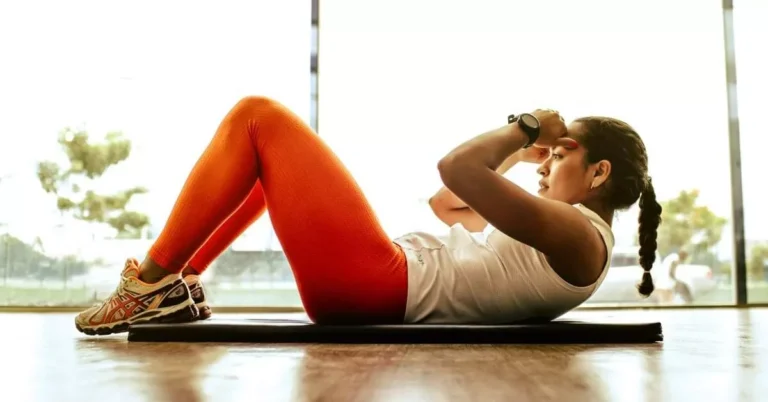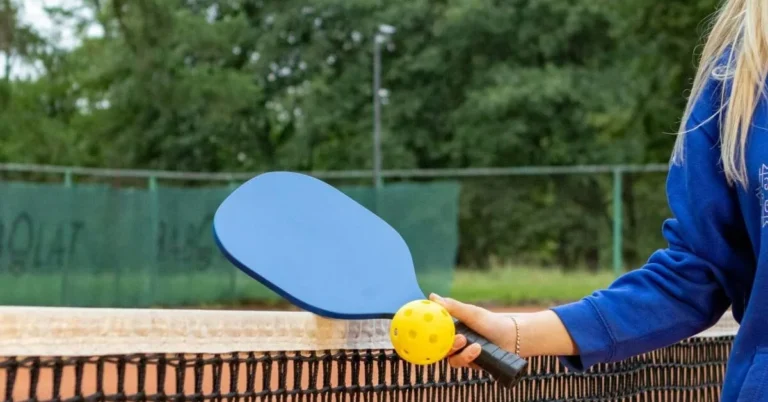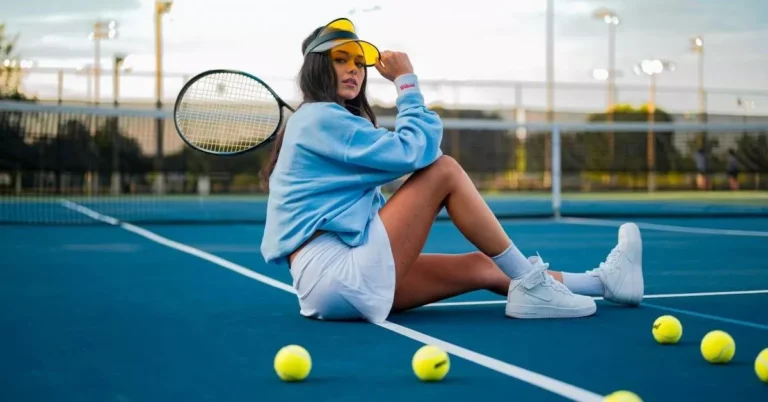Tennis requires quick movements, sudden stops, and changes in direction, which can put a lot of strain on your feet. That’s why it’s crucial to find a shoe that provides both comfort and support. One option that has gained popularity in recent years is barefoot shoes – but is this also true for barefoot tennis shoes?
Barefoot shoes are designed to mimic the feeling of walking or running barefoot while still providing protection and support. They have a thin, flexible sole that allows your feet to move naturally, as if you were barefoot. Some barefoot shoes also have a wide toe box, which allows your toes to spread out and move freely, promoting better balance and stability. In the context of tennis, barefoot shoes can help you feel more connected to the court and improve your agility and footwork.
However, not all barefoot shoes are created equal, especially when it comes to tennis. Tennis requires shoes that can provide enough lateral support to prevent ankle injuries, as well as enough cushioning to absorb shock and protect your feet from the hard court surface. That’s why it’s important to choose a barefoot shoe that is specifically designed for tennis and provides the necessary support and cushioning. In this article, I will explore some of the best barefoot shoes for tennis players, taking into account factors such as comfort, durability, and performance.
Pro:
✅ capability on the court ✅ lightweight ✅ ground feel
Con:
❌ not for every feet suitable
Barefoot Shoes Tennis: An Overview
I have always been interested in finding the perfect shoe that would help me perform at my best on the court. In my search for the perfect shoe, I discovered barefoot shoes, and I have never looked back since.
Barefoot shoes are designed to mimic the feeling of walking or running barefoot, while still providing some protection and support for your feet. When it comes to tennis, barefoot shoes offer several advantages over traditional tennis shoes.
Firstly, barefoot shoes are typically lighter and more flexible than traditional tennis shoes, which allows for greater agility and faster movement on the court. This can be especially beneficial for players who rely on speed and quick movements to outmaneuver their opponents.
Secondly, barefoot shoes are designed to promote a more natural foot movement, which can help reduce the risk of injuries such as ankle sprains and knee pain. This is because the shoes encourage the foot to move in a more natural way, which can help strengthen the muscles and ligaments in the feet and ankles.
Lastly, barefoot shoes often have a wider toe box, which allows the toes to splay out more naturally. This can help improve balance and stability on the court, which can be especially important for players who need to make quick changes in direction.
The Science Behind Barefoot Tennis Shoes
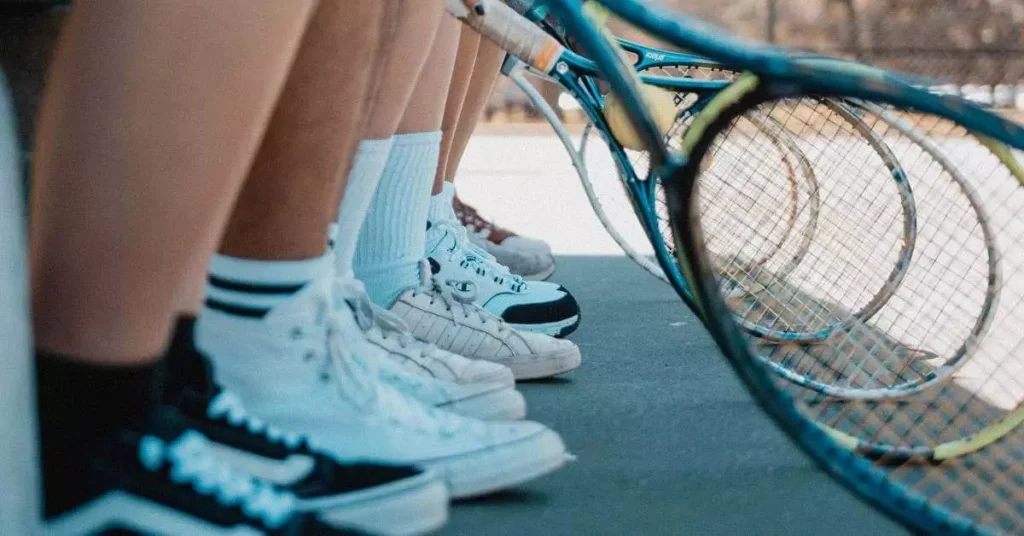
Recently, I’ve been hearing more and more about the benefits of playing in barefoot tennis shoes. In this section, I will explore the science behind barefoot tennis shoes and explain why they may be a game-changer for tennis players.
Biomechanics of Barefoot Tennis
When we play tennis, our feet are constantly moving and adjusting to the demands of the game. Traditional tennis shoes often have thick soles and rigid structures that can limit our foot’s natural range of motion. Barefoot tennis shoes, on the other hand, are designed to mimic the feeling of playing barefoot while still providing protection and support.
Research has shown that playing in barefoot shoes can improve our foot’s proprioception, or our ability to sense our body’s position in space. This increased awareness can help us make quicker, more precise movements on the court. Additionally, barefoot shoes can strengthen the muscles in our feet and lower legs, which can lead to improved balance and stability.
Material Science in Barefoot Shoes
Barefoot tennis shoes are typically made with lightweight, breathable materials that allow our feet to move and flex naturally. Many barefoot shoes also feature thin, flexible soles that provide protection without interfering with our foot’s natural movement.
One of the key materials used in barefoot shoes is Vibram rubber, which is known for its durability and traction. This type of rubber is often used in the soles of barefoot shoes to provide grip and traction on the court.
Another material commonly used in barefoot shoes is mesh, which allows for increased breathability and ventilation. This can help keep our feet cool and dry during long matches.
Benefits of Barefoot Tennis Shoes
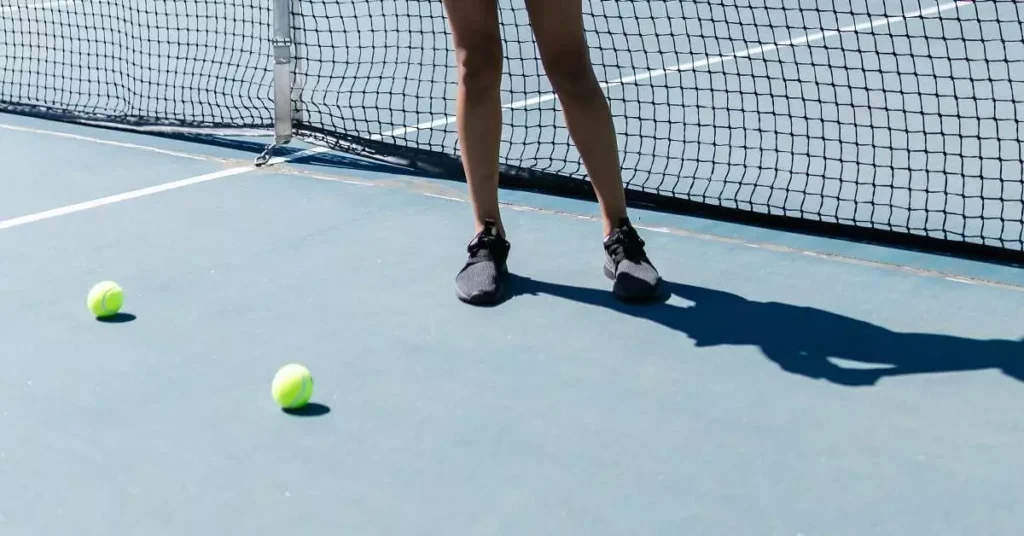
As a tennis player, I have found that wearing barefoot tennis shoes has several benefits. In this section, I will discuss two of the most significant benefits of wearing barefoot tennis shoes: enhanced foot mechanics and injury prevention.
Enhanced Foot Mechanics
Barefoot tennis shoes are designed to mimic the feeling of playing tennis barefoot. This design allows the feet to move more naturally, which can lead to enhanced foot mechanics. When wearing traditional tennis shoes, the feet are often confined, which can lead to weaker foot muscles and poor foot mechanics. By wearing barefoot tennis shoes, the feet are allowed to move more freely, which can help improve foot strength and flexibility.
Injury Prevention
Another benefit of wearing barefoot tennis shoes is injury prevention. Traditional tennis shoes often have a lot of padding and support, which can lead to a false sense of security. This false sense of security can lead to overuse injuries, such as plantar fasciitis and Achilles tendonitis. Barefoot tennis shoes, on the other hand, provide minimal support and allow the feet to move more naturally. This can help prevent overuse injuries by encouraging the feet to work harder and become stronger.
Choosing the Right Barefoot Tennis Shoes
When it comes to choosing the right barefoot tennis shoes, there are a few factors to consider. As a tennis player who has been wearing barefoot shoes for a while, I have learned that the right pair of shoes can make all the difference in terms of performance and comfort. Here are some things to keep in mind when choosing the right barefoot tennis shoes:
Size and Fit
Size and fit are crucial when it comes to barefoot tennis shoes. Unlike traditional tennis shoes, barefoot shoes are designed to fit snugly around the foot, providing a natural, barefoot feel. It’s important to find a pair of shoes that fit your foot perfectly, without any slipping or sliding. When trying on barefoot tennis shoes, make sure to wear the socks you would normally wear when playing tennis. This will give you a more accurate idea of how the shoes will fit during gameplay.
Brand and Quality
When it comes to barefoot tennis shoes, brand and quality are important factors to consider. Look for shoes from reputable brands that specialize in barefoot footwear, such as the Geo Court by Vivobarefoot, the 360 by Xero or the Prio by Xero. These brands will have a better understanding of the unique needs of barefoot tennis players and will design shoes that meet those needs. Additionally, look for shoes that are made with high-quality materials that will last through multiple matches.
Price and Value
Barefoot tennis shoes can range in price from budget-friendly to high-end. While it may be tempting to opt for the cheapest pair of shoes available, it’s important to keep in mind that price often reflects quality. Investing in a higher-priced pair of shoes can pay off in the long run, as they will likely last longer and provide better performance. However, it’s important to find a pair of shoes that fits within your budget and provides good value for the price.
Care and Maintenance of Barefoot Tennis Shoes
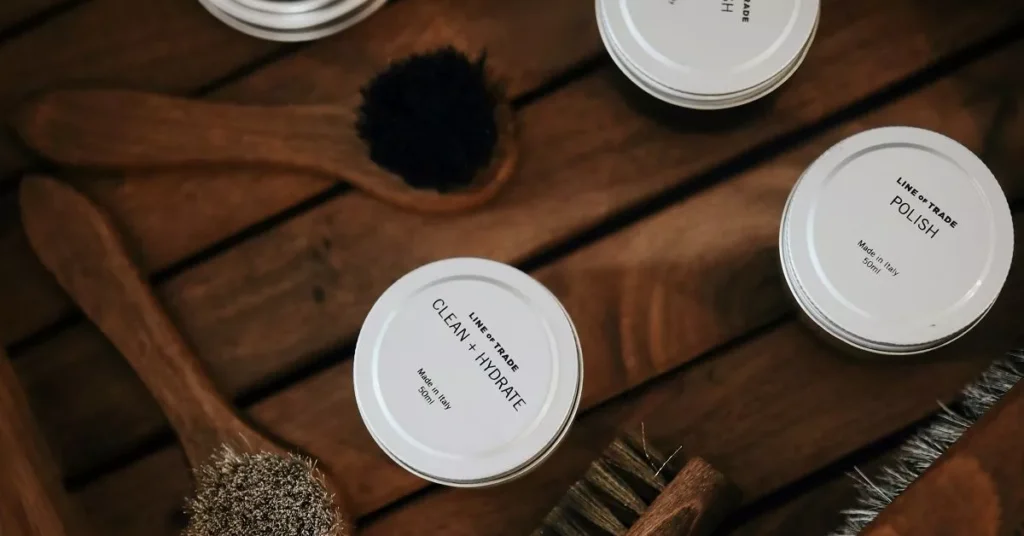
As someone who wears barefoot tennis shoes regularly, I know that proper care and maintenance can help extend the lifespan of these shoes. Here are some tips that I’ve found helpful:
Cleaning
Cleaning your barefoot tennis shoes regularly is important to keep them looking and smelling fresh. You can use a warm soapy sponge or cloth to remove dirt and stains from the shoes. If your shoes need deep cleaning, remove the insoles and soak the shoes in warm soapy water for a maximum of 30 minutes. Rinse the shoes with cold water and gently squeeze them to remove excess water. Let them air dry naturally.
Deodorizing
To keep your barefoot tennis shoes smelling fresh, you can use a mixture of baking soda and hydrogen peroxide. This solution is especially useful for shoes with removable insoles. Pour the mixture into each shoe, let it sit for an hour or two, then rinse them with cold water. Alternatively, you can use a shoe deodorizer spray.
Protection
Barefoot tennis shoes are designed to be flexible and lightweight, but they still need protection from the elements. You can use a waterproofing spray to protect your shoes from water and stains. Be sure to choose a spray that is specifically designed for barefoot shoes.
Storage
Proper storage is important to prevent damage to your barefoot tennis shoes. Store them in a cool, dry place away from direct sunlight. Avoid storing them in a damp environment, as this can cause mold and mildew to grow. You can also stuff them with newspaper to help them maintain their shape while in storage.
By following these simple care and maintenance tips, you can help extend the lifespan of your barefoot tennis shoes and keep them looking and feeling great.
Potential Drawbacks of Barefoot Tennis Shoes
As with any new type of footwear, there are potential drawbacks to using barefoot tennis shoes. Here are a few things to consider before making the switch:
Transition Period
Transitioning to barefoot tennis shoes requires a gradual adaptation phase. Suddenly going barefoot or wearing a minimal shoe can be quite a shock to the foot. It is important to start with short periods of wear and gradually increase the duration over time. This will give your feet time to adjust to the new shoes and prevent injury.
Lack of Support
Barefoot tennis shoes are designed to mimic the feeling of being barefoot, which means they provide little to no support. This lack of support can be a problem for people with flat feet, high arches, or other foot conditions. It is important to consult with a podiatrist before switching to barefoot tennis shoes to make sure they are appropriate for your feet.
Increased Risk of Injury
Because barefoot tennis shoes provide little to no support, they can increase the risk of injury. Without the cushioning and stability provided by traditional tennis shoes, the feet and ankles are more susceptible to sprains, strains, and other injuries. It is important to be mindful of your movements and avoid sudden changes in direction or impact.
Limited Durability
Barefoot tennis shoes are often made with minimal materials, which can make them less durable than traditional tennis shoes. The thin soles and lightweight construction may not hold up well over time, especially with frequent use. It is important to invest in high-quality barefoot tennis shoes and replace them as needed to avoid injury and discomfort.
FAQ
What are the benefits of wearing barefoot shoes for tennis?
Wearing barefoot shoes for tennis can help improve your natural foot strength and balance. It also allows your feet to move more naturally, which can help prevent injuries and improve your overall foot health. Barefoot shoes can also provide a better feel for the court and help you develop a better sense of your footwork.
How do barefoot shoes compare to traditional tennis shoes?
Barefoot shoes are designed to mimic the feeling of being barefoot, while still providing some protection and support. They have a thinner sole, zero-drop design, and wider toe box than traditional tennis shoes. Traditional tennis shoes, on the other hand, have thicker soles, more cushioning, and a higher heel-to-toe drop. They are designed to provide more support and shock absorption.
What are some recommended brands for barefoot tennis shoes?
Some recommended brands for barefoot tennis shoes include Xero Shoes, Vivobarefoot, and Merrell. These brands offer a variety of options for different types of tennis players, from beginners to professionals.
Can barefoot shoes improve your tennis game?
Wearing barefoot shoes can help improve your tennis game by allowing you to move more naturally and feel the court better. It can also help strengthen your feet and improve your balance, which can lead to better footwork and overall performance.
Are there any downsides to wearing barefoot shoes for tennis?
While barefoot shoes can provide many benefits, they may not be suitable for everyone. Some players may find them uncomfortable or may need more support than barefoot shoes can provide. It’s important to try on different types of barefoot shoes and find the right fit for your foot type and playing style.
What type of tennis shoes are allowed in tournaments?
Most tournaments allow any type of tennis shoe as long as it meets certain requirements, such as having a non-marking sole and not causing damage to the court. However, it’s always a good idea to check with the tournament rules and regulations before wearing a new type of shoe.
Have you tried playing tennis with barefoot shoes? Share your experiences and let’s discuss how they can help elevate our game. Leave your thoughts in the comments below and let’s take our tennis performance to the next level together!

